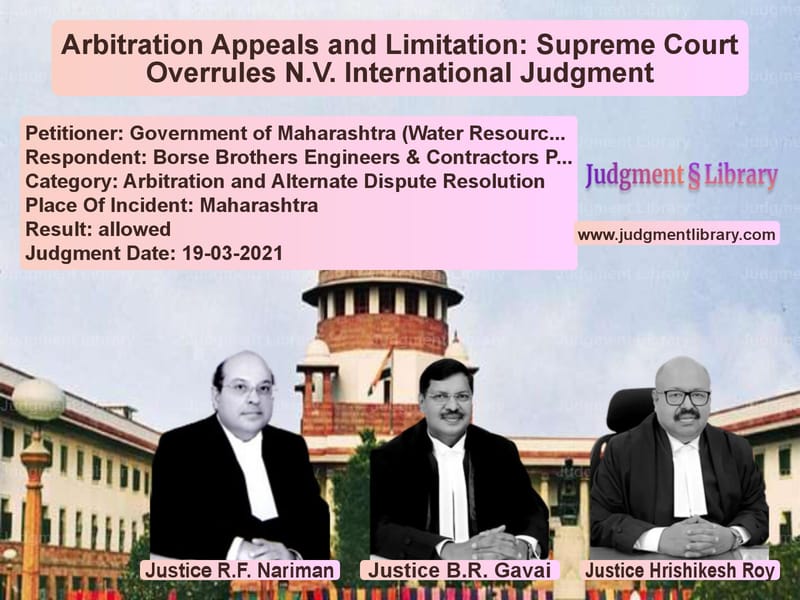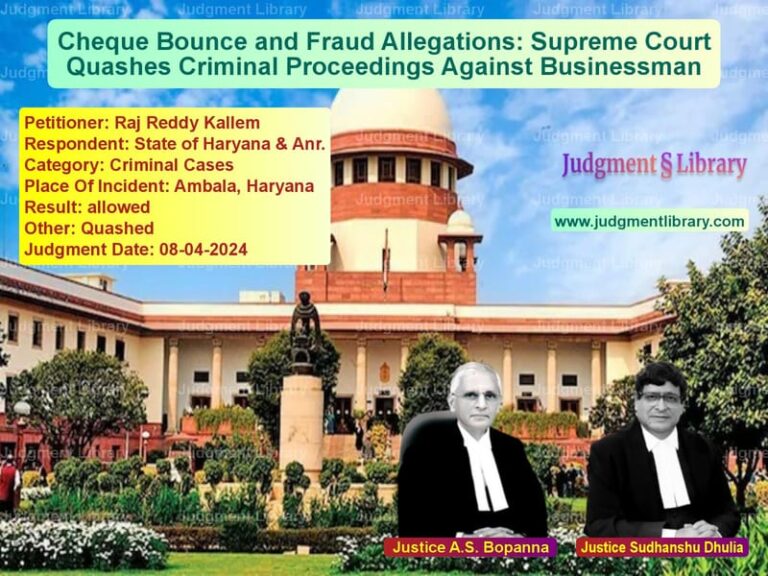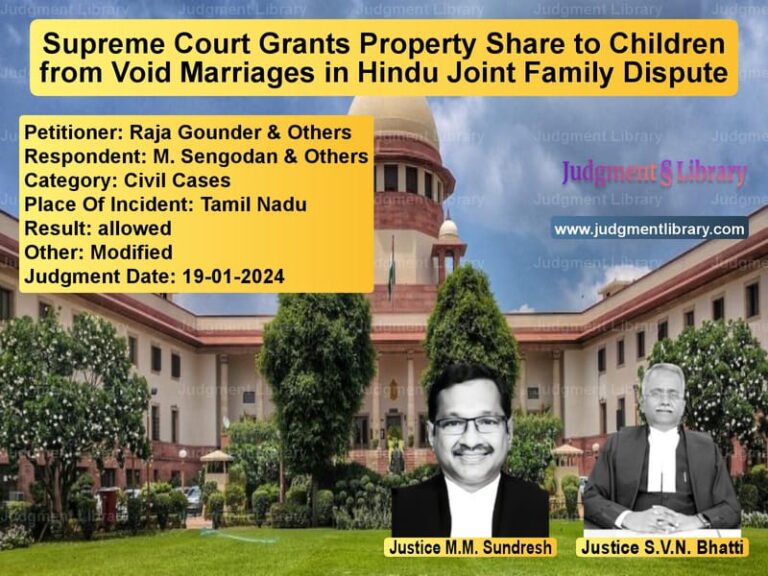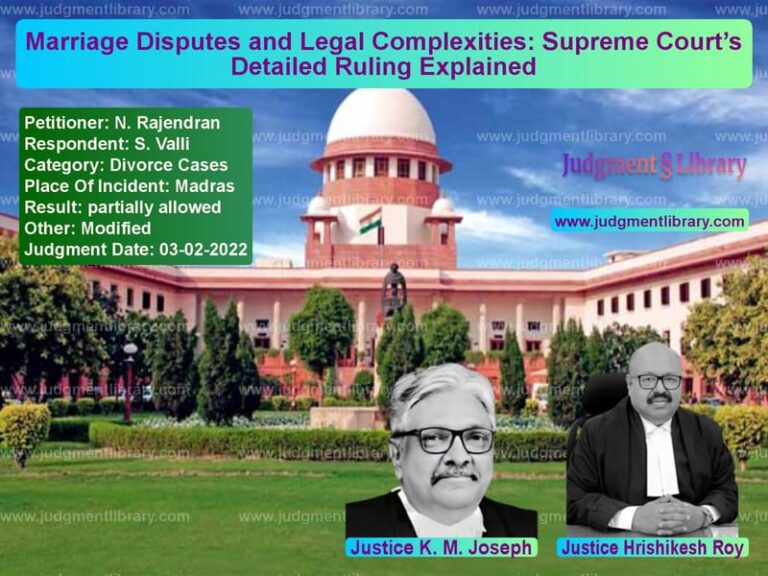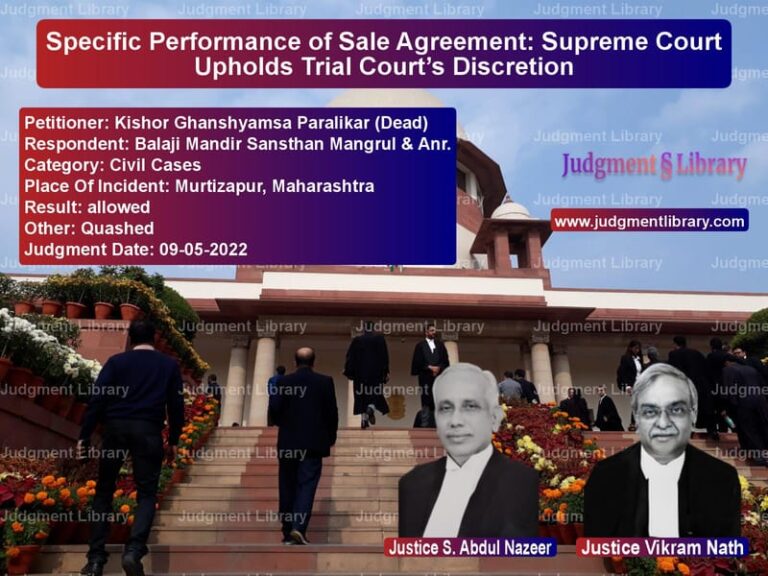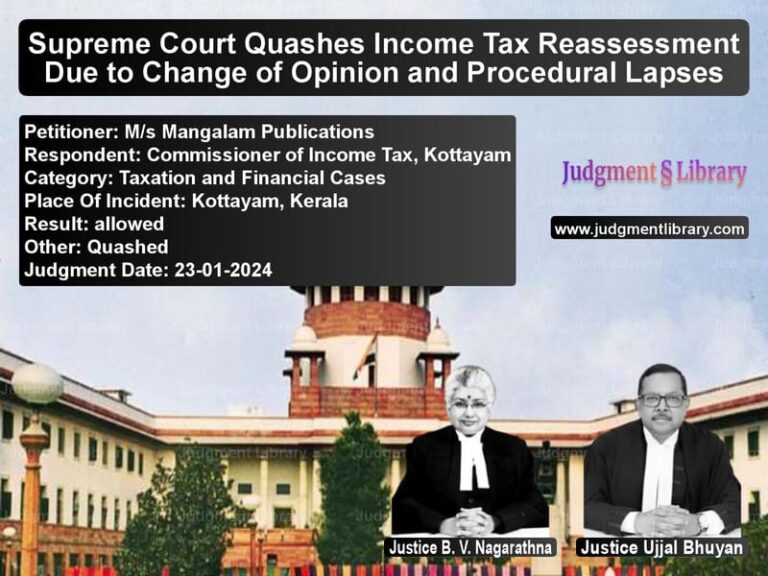Arbitration Appeals and Limitation: Supreme Court Overrules N.V. International Judgment
The Supreme Court of India, in the case of Government of Maharashtra (Water Resources Department) v. Borse Brothers Engineers & Contractors Pvt. Ltd., delivered an important judgment on March 19, 2021. This case clarified the limitation period for filing appeals under Section 37 of the Arbitration and Conciliation Act, 1996 and overturned the ruling in N.V. International v. State of Assam. The judgment has significant implications for arbitration appeals, particularly concerning delay condonation and adherence to strict time limits.
The primary issue in the case was whether the previous ruling in N.V. International correctly interpreted the limitation period for arbitration appeals. The Supreme Court, after detailed analysis, concluded that the rigid bar on delay condonation beyond 120 days was incorrect and needed reconsideration.
Background of the Case
The dispute arose between the Government of Maharashtra (Water Resources Department) and Borse Brothers Engineers & Contractors Pvt. Ltd. The government had filed an appeal under Section 37 of the Arbitration and Conciliation Act, 1996, challenging an arbitral award. However, there was a substantial delay in filing the appeal, leading to the question of whether the delay could be condoned under the Limitation Act, 1963.
The High Courts of Bombay, Delhi, and Madhya Pradesh had ruled differently on whether delays in arbitration appeals could be condoned. The Bombay and Delhi High Courts, relying on the judgment in N.V. International, refused to condone the delay, while the Madhya Pradesh High Court held that the limitation period could be extended under Section 5 of the Limitation Act.
Arguments by the Petitioner (Government of Maharashtra)
The Government of Maharashtra raised several arguments challenging the strict limitation period imposed by the ruling in N.V. International. Their key contentions were:
- The Arbitration Act originally aimed to provide an alternative dispute resolution mechanism, rather than strictly imposing time limits.
- The Commercial Courts Act, 2015, introduced a uniform limitation period of 60 days for commercial appeals, contradicting the rigid approach in N.V. International.
- Section 5 of the Limitation Act should be applied to arbitration appeals, allowing courts to condone delays where justified.
- There was no explicit provision in the Arbitration Act that barred delay condonation beyond 120 days.
- The limitation period should not be the same for all types of appeals under Section 37, as different appeals arise from different procedural circumstances.
Arguments by the Respondent (Borse Brothers Engineers & Contractors Pvt. Ltd.)
The respondents argued in favor of strict adherence to limitation periods, contending that:
- The Arbitration Act prioritizes speedy dispute resolution, and allowing delays would defeat this purpose.
- Administrative inefficiencies within government departments should not justify excessive delays.
- The High Court decisions refusing to condone delays were correct, as they followed the ruling in N.V. International.
- Inconsistent application of limitation periods would lead to unnecessary litigation and uncertainty.
- Allowing indefinite delays would go against the legislative intent of arbitration law, which aims for finality and efficiency.
Key Observations by the Supreme Court
The judgment, delivered by R.F. Nariman, B.R. Gavai, and Hrishikesh Roy, made several critical observations:
- The decision in N.V. International was incorrect and is therefore overruled.
- While delays should not be condoned lightly, an absolute bar on delay condonation is not justified.
- The Commercial Courts Act provides a uniform limitation period of 60 days for arbitration appeals, which should be followed.
- Section 5 of the Limitation Act applies to arbitration appeals, allowing for delay condonation in exceptional cases.
- Delays beyond 60 days should be condoned only in cases where sufficient cause is shown.
Final Verdict
The Supreme Court ruled as follows:
- Delays beyond 60 days in arbitration appeals should not be condoned except in exceptional cases.
- The ruling in N.V. International is overruled as it imposed an unjustified absolute bar on delay condonation.
- Government entities cannot claim special treatment in seeking delay condonation.
Implications of the Judgment
This judgment has far-reaching implications for arbitration law and commercial litigation:
- It provides greater flexibility for courts to consider exceptional circumstances in arbitration appeals.
- It ensures that the objective of speedy dispute resolution is maintained without imposing an unfairly rigid limitation period.
- It clarifies that while delays can be condoned, the courts must carefully scrutinize each case to ensure that condonation is justified.
- It aligns arbitration appeal procedures with the provisions of the Commercial Courts Act, 2015, ensuring consistency in commercial litigation.
Overall, the judgment balances the need for efficiency in arbitration with the principle of justice and fairness. By allowing delay condonation in exceptional cases, the Supreme Court has ensured that the law remains flexible enough to address genuine hardships while preventing unnecessary delays in arbitration proceedings.
Petitioner Name: Government of Maharashtra (Water Resources Department).Respondent Name: Borse Brothers Engineers & Contractors Pvt. Ltd..Judgment By: Justice R.F. Nariman, Justice B.R. Gavai, Justice Hrishikesh Roy.Place Of Incident: Maharashtra.Judgment Date: 19-03-2021.
Don’t miss out on the full details! Download the complete judgment in PDF format below and gain valuable insights instantly!
Download Judgment: government-of-mahara-vs-borse-brothers-engin-supreme-court-of-india-judgment-dated-19-03-2021.pdf
Directly Download Judgment: Directly download this Judgment
See all petitions in Arbitration Act
See all petitions in Dispute Resolution Mechanisms
See all petitions in Judgment by Rohinton Fali Nariman
See all petitions in Judgment by B R Gavai
See all petitions in Judgment by Hrishikesh Roy
See all petitions in allowed
See all petitions in supreme court of India judgments March 2021
See all petitions in 2021 judgments
See all posts in Arbitration and Alternate Dispute Resolution Category
See all allowed petitions in Arbitration and Alternate Dispute Resolution Category
See all Dismissed petitions in Arbitration and Alternate Dispute Resolution Category
See all partially allowed petitions in Arbitration and Alternate Dispute Resolution Category

